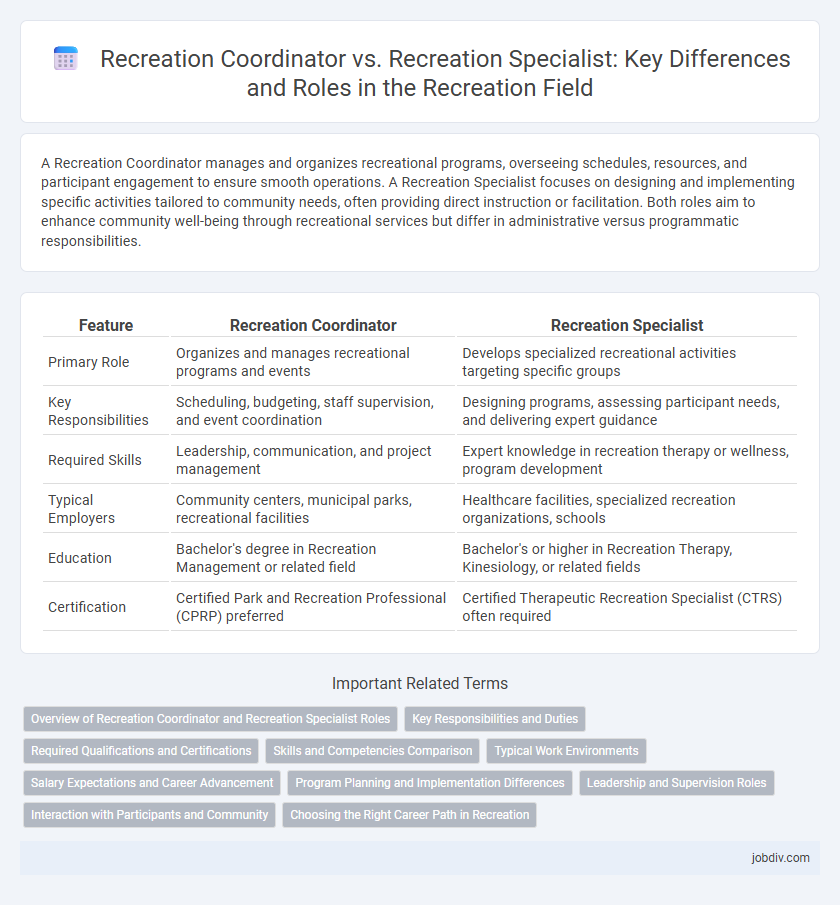A Recreation Coordinator manages and organizes recreational programs, overseeing schedules, resources, and participant engagement to ensure smooth operations. A Recreation Specialist focuses on designing and implementing specific activities tailored to community needs, often providing direct instruction or facilitation. Both roles aim to enhance community well-being through recreational services but differ in administrative versus programmatic responsibilities.
Table of Comparison
| Feature | Recreation Coordinator | Recreation Specialist |
|---|---|---|
| Primary Role | Organizes and manages recreational programs and events | Develops specialized recreational activities targeting specific groups |
| Key Responsibilities | Scheduling, budgeting, staff supervision, and event coordination | Designing programs, assessing participant needs, and delivering expert guidance |
| Required Skills | Leadership, communication, and project management | Expert knowledge in recreation therapy or wellness, program development |
| Typical Employers | Community centers, municipal parks, recreational facilities | Healthcare facilities, specialized recreation organizations, schools |
| Education | Bachelor's degree in Recreation Management or related field | Bachelor's or higher in Recreation Therapy, Kinesiology, or related fields |
| Certification | Certified Park and Recreation Professional (CPRP) preferred | Certified Therapeutic Recreation Specialist (CTRS) often required |
Overview of Recreation Coordinator and Recreation Specialist Roles
Recreation Coordinators manage and organize community programs, oversee staff, and ensure activities run smoothly to enhance public engagement. Recreation Specialists focus on designing specialized recreational programs tailored to specific populations, such as seniors or individuals with disabilities, emphasizing therapeutic and skill-building activities. Both roles require strong communication skills and a deep understanding of recreation management to promote health and wellness through diverse program offerings.
Key Responsibilities and Duties
A Recreation Coordinator manages program planning, staff scheduling, and budgeting to ensure successful community and recreational activities. A Recreation Specialist focuses on developing, implementing, and evaluating specific programs such as sports, fitness, and arts to meet participant needs and enhance engagement. Both roles require strong interpersonal skills, but the coordinator emphasizes organizational leadership while the specialist concentrates on direct program delivery and participant interaction.
Required Qualifications and Certifications
Recreation Coordinators typically require a bachelor's degree in recreation, leisure studies, or a related field, along with certifications such as CPR and First Aid, and sometimes Certified Park and Recreation Professional (CPRP) credentials. Recreation Specialists often need specialized training or an associate's or bachelor's degree in specific areas like therapeutic recreation or sports management, with certifications including Therapeutic Recreation Specialist (CTRS) or American Red Cross lifeguard certification. Both roles emphasize strong organizational skills and knowledge of program development, but coordinators usually have broader administrative responsibilities requiring additional leadership or management certifications.
Skills and Competencies Comparison
Recreation Coordinators excel in organizational skills, program management, and community engagement, ensuring smooth operation of recreational activities and effective resource allocation. Recreation Specialists demonstrate expertise in specialized recreational areas such as therapeutic recreation, fitness training, or outdoor education, emphasizing client assessment and personalized program development. Both roles require strong communication, leadership, and problem-solving abilities, but Recreation Specialists typically possess deeper technical knowledge in their specific domain.
Typical Work Environments
Recreation Coordinators typically work in community centers, municipal parks departments, and nonprofit organizations focused on planning and supervising recreational programs. Recreation Specialists are often employed within healthcare facilities, rehabilitation centers, or specialized recreational therapy programs where they design therapeutic activities for diverse populations. Both roles engage with public spaces but differ in environment specificity, with Coordinators managing broad program logistics and Specialists focusing on therapeutic recreation settings.
Salary Expectations and Career Advancement
Recreation Coordinators typically earn an average salary ranging from $40,000 to $55,000 annually, reflecting their role in organizing and managing community programs, while Recreation Specialists often command higher salaries between $50,000 and $70,000 due to their expertise in designing specialized recreational activities. Career advancement for Recreation Coordinators may lead to supervisory or program management positions within local government or nonprofit organizations, whereas Recreation Specialists have opportunities to move into advanced therapeutic recreation roles, leadership in specialized recreation services, or pursue certifications for higher-level positions. Salary growth in both careers depends on education, experience, and geographic location, with professional development enhancing prospects for promotion and increased earnings.
Program Planning and Implementation Differences
A Recreation Coordinator primarily manages program logistics, including scheduling, budgeting, and resource allocation, ensuring smooth implementation of recreational activities. In contrast, a Recreation Specialist focuses on designing and developing specialized programs tailored to specific populations or community needs, emphasizing participant engagement and outcomes. Both roles require collaboration but differ in their emphasis on operational management versus program content expertise.
Leadership and Supervision Roles
Recreation Coordinators typically lead program development and supervise staff, ensuring smooth operation and adherence to budgetary guidelines, while Recreation Specialists focus on direct service delivery, activity planning, and participant engagement. Leadership in Recreation Coordination involves strategic oversight, team management, and community partnership development, whereas Recreation Specialists emphasize expertise in specific recreational activities and providing hands-on guidance. Supervisory responsibilities distinguish Coordinators by requiring administrative leadership and resource allocation compared to Specialists' operational role in program implementation.
Interaction with Participants and Community
Recreation Coordinators focus on organizing and facilitating community programs, emphasizing direct interaction with participants to ensure activities meet local needs and preferences. Recreation Specialists often concentrate on developing specialized recreational activities and assessing participant engagement to enhance program effectiveness. Both roles require strong communication skills to build relationships within the community and foster inclusive, enjoyable environments.
Choosing the Right Career Path in Recreation
Recreation Coordinators oversee program development and manage staff to ensure smooth operation of community activities, focusing on logistics and resource allocation. Recreation Specialists deliver direct services by creating and leading specialized programs tailored to diverse populations, emphasizing participant engagement and skill development. Choosing the right career path depends on whether one prefers administrative leadership or hands-on interaction within recreational services.
Recreation Coordinator vs Recreation Specialist Infographic

 jobdiv.com
jobdiv.com